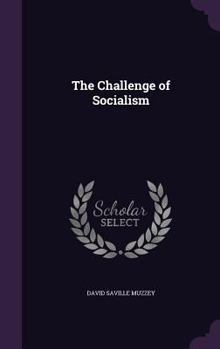The Challenge of Socialism (Classic Reprint)
Select Format
Select Condition 
Book Overview
This work is in the public domain in the United States of America, and possibly other nations. Within the United States, you may freely copy and distribute this work, as no entity (individual or corporate) has a copyright on the body of the work.
As a reproduction of a historical artifact, this work may contain missing or blurred pages, poor pictures, errant marks, etc. Scholars believe, and we concur, that this work is important enough to be preserved, reproduced, and made generally available to the public. We appreciate your support of the preservation process, and thank you for being an important part of keeping this knowledge alive and relevant.
Customer Reviews
Rated 5 starsAre you ready?
"Some of you believe in the idea of reincarnation. You come and ask me what I believe, whether reincarnation is a fact or not, whether I remember my past lives, and so on. Now, why do you ask me? Why do you want to know what I think about it? You want a further confirmation of your own belief, which you call a fact, a law, because it gives you a hope, a purpose in life. Thus, belief becomes to you a fact, a law, and you go...
5Report
Rated 5 starsThe Most Important Book Ever....
Forget Zen Buddhism, Freud, Psychiatrists, forget everything you think you know. Just read and see what Krishnamurti sees. To see without prejudice to see with a free mind. This book has changed my life forever. I know who I am now, I found this out myself, not by being told what is right or wrong but by seeing with a clear mind. You are the only person who can save yourself. Don't even think about buying this book, just buy...
2Report
Rated 5 starsinvaluable collection
Krishnamurti provided a difficult antidote for the Western tendency toward conceptual clutter: cut through to the heart of that clutter and sit with it until it silences itself. Be prepared to do the work of LOOKING if you buy this book, whose thesis is that where awareness operates and thought comes to an end, perhaps there can flower a different kind of intelligence that has nothing to do with intellect; an intelligence...
2Report
Rated 5 starsWake Up
Read this book and wake up to the fears, misery and conflict that prevades your life. Whether you admit it or not it is there, and Jiddu Krishnamurti will not only point it out to you but show you the way to "change". This is not a "self-help" book or for those looking for a step-by-step instruction guide to finding happiness or intelligence. Instead, this book is a wake-up call. He has a simple message that is conveyed...
2Report
Rated 5 starsRelease Your Mind
I believe that by reading this book you will be able to open your mind to all challenges and seek inner peace. His philosophy of using all of you rintelligence before you consider an action will definently amaze you. A must read to start your inner "healing"
2Report





















